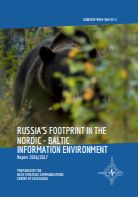RUSSIA’S NARRATIVES AND PUBLIC OPINION IN THE BALTIC STATES, FINLAND, AND SWEDEN
RUSSIA’S NARRATIVES AND PUBLIC OPINION IN THE BALTIC STATES, FINLAND, AND SWEDEN
Author(s): Ieva Bērziņa
Subject(s): Politics, Media studies, Geography, Regional studies, Communication studies, International relations/trade, Evaluation research
Published by: NATO Strategic Communications Centre of Excellence
Keywords: Russia; Baltic States; Finland; Sweden; narratives; public opinion; information; NB8; Sputnik; RT; Perviy kanal;
Summary/Abstract: The study of Russian narratives regarding the NB8 countries identified the most common ‘outgoing’ narratives used in 2016. However, mere content analysis is not a sufficient metric to assess Russia’s influence in the information environment, because media is just an instrument for reaching the ultimate target—the cognitive dimension of the communities that reside in the NB8 countries. Therefore the final ingredient in this study of Russia’s activities in the information environment of the NB8 region for the period 2016–2017 was a comparative public opinion survey that aimed to discover to what extent the narratives promoted by Russia correspond with the views of the societies in the region. It should be emphasized that measuring Russia’s influence in information environment is a complicated task. Four issues limit the possibility of arriving at comprehensive and unambiguous answers by means of a limited quantitative survey: 1) there are no strict divisions between the narratives promoted by Russia and the views of opinion leaders and societies outside Russia—they may coincide without any specific connection to Russia; 2) without qualitative research methods it is impossible to know how the respondents understand such concepts as ‘neo-Nazism’, ‘threat’, ‘destabilization’, etc., and if their understanding differs from the interpretation assumed in the Russian narratives; 3) without additional research it is also impossible to draw any conclusions about the factors influencing of the opinions of respondents, therefore coincidence in views can not necessarily be interpreted as due to Russia’s influence or, indeed, as the absence of it; 4) additional research is necessary to determine how Russia seeks to match its narratives to the attitudes present in the NB8 societies to advance its strategic goals, and, indeed, if this is possible. Nevertheless, an initial attempt was made to measure the spread of the narratives promoted by Russia in the NB8 region in terms of public agreement or disagreement with the ideas that are in line with the content produced by Russian state-funded media and Russia’s strategic goals. Although the survey data should primarily be taken as a basis for further research, the results provide a valuable comparative perspective on public opinion in the NB8 region and the extent of the use of the three Russian state funded media outlets surveyed. The data obtained in this pilot study supports a more sceptical view regarding Russia’s informational influence on Western societies as expressed by prominent Russian expert M. Galeotti: ‘Too much is often made of the alleged influence of the English-language Sputnik news agency and RT television channel, or even of the online trolling and disinformation campaign. Evidence that they actually changed minds—rather than just pandered to existing prejudices—is still lacking.
Book: RUSSIA’S FOOTPRINT IN THE NORDIC - BALTIC INFORMATION ENVIRONMENT
- Page Range: 79-103
- Page Count: 25
- Publication Year: 2018
- Language: English
- Content File-PDF

